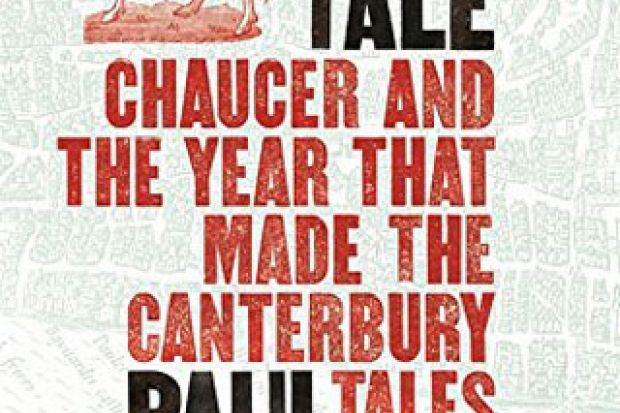Geoffrey Chaucer’s “drasty rhyming is not worth a turd!”. So says Harry Bailly, the fictional Host of the Canterbury pilgrimage, after interrupting the poet’s own Tale of Sir Thopas. The value of Chaucer’s rhyme has since risen, but he never directly profited from his writing, at least as far as the historical record indicates. In the many documents attesting to Chaucer’s “official” life within the royal bureaucracy, he was never paid a farthing – arguably the medieval cash equivalent of a turd – for his poetry.
The gap between these two Chaucers has long necessitated invention. Here, Paul Strohm offers a “microbiography”, recontextualising and interpreting pivotal events in and leading up to Chaucer’s “exit from London” in the year 1386. This move, according to Strohm, exiles Chaucer from his familiar circle of court clerks and forces him to find a new audience in his imagination. Reviving an argument from his earlier scholarly study, Social Chaucer (1989), Strohm delivers a readable narrative of city politics to frame Chaucer’s everyday circumstances.
Strohm contextualises the well-known, yet unconnected, points of Chaucer’s biography. Like most appointments, “his selection as a shire knight [in autumn 1386] was probably a result of his sponsors’ wishes rather than his own desires”. Chaucer’s own hidden wishes, one might say, are the true subject of Strohm’s book. They are found within Chaucer’s poetry, submerged as the desires of others – figures of Chaucer’s literary creation and thus at a remove. But they are also wishes for a broader audience beyond the confines of the courtly circles that Strohm imagines for Chaucer. The year 1386, as configured, forms a break – a moment of crisis out of which the Canterbury fiction is invented. But the “revolutionary break” narrative winds up obfuscating many of the consistencies with Chaucer’s earlier poetry. Distance was always Chaucer’s signature move in his creation of dreamers and narrators, before geographic distance became a matter of record with his move to Kent.
For a book advertising itself as a narrative of a single year, The Poet’s Tale will seem as though it has taken the long way round; we arrive at 1386 only after 154 pages, the end point of each of Strohm’s uniquely focused first four chapters. This story is plausible, at times even gripping, as he reshapes matters into a Dantean narrative of exile and withdrawal. He tells a story of insolvency, seeing Chaucer’s recorded debts as a damning narrative (whereas the standard biography reads this situation quite differently). But given that these events lead us to the end of 1386, why couldn’t Chaucer have had the idea in early 1387? For no other reason than that this is the standard date at which we assume he began The Canterbury Tales already, making for a less dramatic-sounding narrative.
So the sharpest change Strohm makes to the received story is perhaps the darkness in which he puts Chaucer’s writing before 1386. He asks why Chaucer’s literary reputation did not save him from these tumultuous events, why he was so easily sent away and got rid of, and surmises that it was because “he was not yet a celebrated writer”. By other accounts, however, Chaucer was then at the height of his literary fame, and the move to Kent planned as early as 1385.
My point is not to disabuse potential readers. This tale is a good one, but it is not unqualified fact. It is a sceptical presentation of the London political scene around which Chaucer worked and an imaginative interpretation of how his movements in and through that world sparked the idea for his greatest work.
The Poet’s Tale: Chaucer and the Year that Made The Canterbury Tales
By Paul Strohm
Profile, 288pp, £15.99
ISBN 9781781250594
Published 15 January 2015
Register to continue
Why register?
- Registration is free and only takes a moment
- Once registered, you can read 3 articles a month
- Sign up for our newsletter
Subscribe
Or subscribe for unlimited access to:
- Unlimited access to news, views, insights & reviews
- Digital editions
- Digital access to THE’s university and college rankings analysis
Already registered or a current subscriber?





